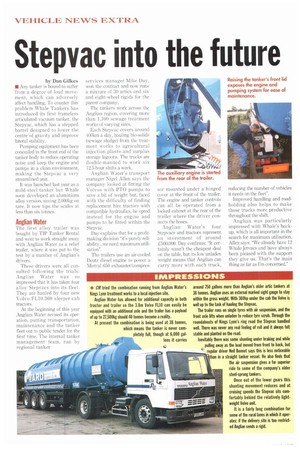Stepvac into the future
Page 18

If you've noticed an error in this article please click here to report it so we can fix it.
by Dan Gilkes • Any tanker is bound to suffer from a degree of load movement, which can adversely affect handling. To counter this problem Whale Tankers has introduced its first frameless articulated vacuum tanker, the Stepvac, which has a stepped barrel designed to lower the centre of gravity and improve lateral stability.
Pumping equipment has been concealed in the front end of the tanker body to reduce operating noise and keep the engine and pumps in a clean environment, making the Stepvac a very streamlined unit.
It was launched last year as a mild-steel tanker but Whale soon developed an aluminium alloy version, saving 2,000kg on tare. It now tips the scales at less than six tonnes.
The first alloy trailer was bought by TIP Tanker Rental and went to work straight away with Anglian Water as a relief trailer, where it was put to the test by a number of Anglian's drivers.
These drivers were all consulted following the trials: Anglian Water was so impressed that it has taken four alloy Stepvacs into its fleet. They are hauled by four new Volvo FL10.360 sleeper-cab tractors.
At the beginning of this year Anglian Water revised its operation, putting transportation, maintenance and the tanker fleet out to public tender for the first time. The internal tanker management team, run by regional tanker services manager Mike Day, won the contract and now runs a mixture of 30 artics and six and eight-wheel rigids for the parent company.
The tankers work across the Anglian region, covering more than 1.100 sewage treatment works of varying sizes.
Each Stepvac covers around 400km a day, hauling bio-solids (sewage sludge) from the treatment works to agricultural injection plants and surplus storage lagoons. The trucks are double-manned to work six 12.5-hour shifts a week.
Anglian Water's transport manager Nigel Allen says the company looked at fitting the Volvos with PTO pumps to save a bit of weight but, faced with the difficulty of finding replacement hire tractors with compatible hydraulics, he opted instead for the engine and pumps to be fitted within the Stepvac.
Day explains that for a profitmaking division "it's purely reliability...we need maximum utilisation".
The trailers use an air-cooled Deutz diesel engine to power a Mistral 650 exhauster/compres sor mounted under a hinged cover at the front of the trailer. The engine and tanker controls can all be operated from a locked cabinet at the rear of the trailer where the driver connects the hoses.
Anglian Water's four Stepvacs and tractors represent an investment of around £500,000. Day confirms: "It certainly wasn't the cheapest deal on the table, but its low unladen weight means that Anglian can carry more with each truck,
reducing the number of vehicles it needs on the fleet".
Improved handling and roadholding also helps to make those trucks more productive throughout the shift.
Anglian was particularly impressed with Whale's backup, which is all important in the search for maximum utilisation. Allen says: "We already have 12 Whale Jetvacs and have always been pleased with the support they give us. That's the main thing as far as I'm concerned."








































































































